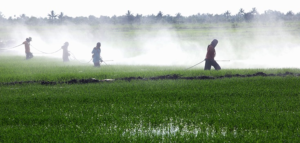The Minnesota Environmental Partnership is proud to feature the following post as part of a series of columns as part of a Student Voices Series issues. This is part of a continuing collaboration with Macalester College’s Geography Department and its students.
Contributed by Julia Fritz-Endres, Macalester student:
When was the last time you swam in a lake, splashed in a stream, or drank tap water from your sink? Chances are, you have interacted with surface or groundwater at least once today. Water is omnipresent in our lives, and it is essential to our survival. When our water sources are contaminated, we pay the consequences.
For a state proud to call itself the ‘land of 10,000 lakes,’ Minnesota is struggling to keep its lakes clean and healthy. According to the Minnesota Pollution Control Agency, about 40% of water bodies in the state are ‘impaired,’ meaning that they fail to meet water quality standards. Many of the pollutants impairing these waters come from pesticides, which can increase health risks when highly concentrated.
The only way that we can hope to track the use of pesticides near water bodies, and to prevent dangerous amounts of pesticides from entering our bodies, is to stop mass dumping of those chemicals. The good news is that the Clean Water Act currently requires pesticide permits nation-wide for anyone planning to spray pesticides near bodies of water. This permit requirement helps to keep Minnesotan lakes clean, and allows the Minnesotans to track what pesticides do enter their waterways.
The bad news? Ohio Representative Bob Gibbs has proposed the Reducing Regulatory Burdens Act, which aims to do away with the permit requirement entirely. Nicknamed the “Poison Our Waters Act,” the bill would allow anyone to spray pesticides into or near any water bodies they choose. On May 24, 2017, the bill was approved by the House of Representatives. The U.S. Senate will vote next on the bill.
If signed into law, the bill would limit all oversight, federal and local, of pesticide spraying. On the federal level, this would undermine the Clean Water Act and the protection of U.S. waterways. In Minnesota, this would reduce the State Government’s ability to notify the public about pesticide contamination in local water bodies, including groundwater and wells. For a state like Minnesota, which is already struggling to keep its waters clean, the “Poison Our Waters Act” would be a huge step backward.
The act may also increase health problems across the state. A survey conducted by the United States Geological Survey found that atrazine, a popular pesticide in Minnesota, is found most commonly in water bodies of the Midwest. The Environmental Protection Agency states that atrazine is a highly dangerous chemical that increases one’s likelihood of developing cancer and reproductive problems. If permits are not required for using harmful chemicals, anyone can spray large quantities of atrazine without repercussion.
Why do some lawmakers want to pass the “Poison Our Waters Act,” knowing that it may have detrimental effects on public health? Some argue that the bill would protect farmers’ rights by reducing burdens on their pesticide usage. However, the permit requirement does not apply to runoff from land-based agriculture and other non-point sources of pollution. Farmers have no burdens to begin with. The bill would actually increase burdens on farmers by polluting water bodies that everyone (including farmers) rely upon.
Either the proponents of this bill are ignorant of its health costs, or they are willing to accept those consequences in order to benefit pesticide companies supporting the bill. The latter seems far more likely. They want to help pesticide companies make money, even if that means limiting public knowledge of pollution and crippling Minnesota’s ability to protect its water.
The U.S. Senate Committee on Environment and Public Works will vote next on the bill. Contact your representatives and tell them to vote no on the Reducing Regulatory Burdens Act. This is our opportunity to stand up, to protect one of our most vital natural resources, and to take action against those who want to restrict public knowledge and poison our waters.
Further reading: House Passes Bill Nicknamed “Poison Our Waters Act”

When will the people recognize that Republican legislators care only about business, and sell people en masse downstream in polluted waters? The Poison Our Waters Act is only destructive. Its profits are short-lived. How can we grow as a society when we’ve destroyed our lands and waters? What will such legislators, much less the corporations they purport to serve, live on, when our foods and waters are no longer healthful?
How, further, can a corporation vote, contribute to legislation, as a “citizen”? It is the only entity that can live without food and water. Thus, it ‘votes’ without conscience. It is, in fact, inhuman. Wake up, Minnesota! Wake up America! Get a life!